Important moments in Turkey labor history
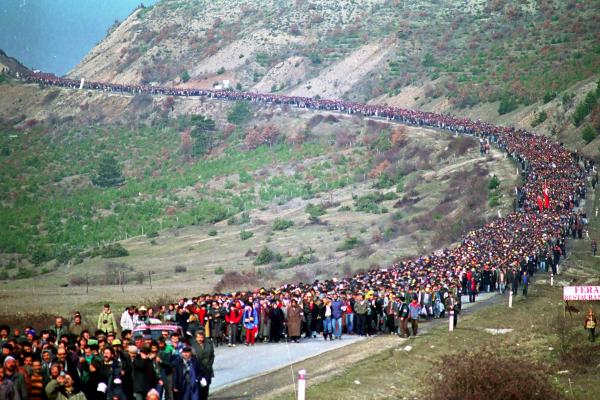
Türkiye history can be divided into six important periods: The period before the declaration of the Republic (the Ottoman Empire period), the “single-party regime” period from the declaration of the Republic to the first free general elections in 1950, the Democrat Party period between 1950 and 1960, the period between two military coups (1960-1980), the neoliberal period after 1980 and The AKP government period after 2002.
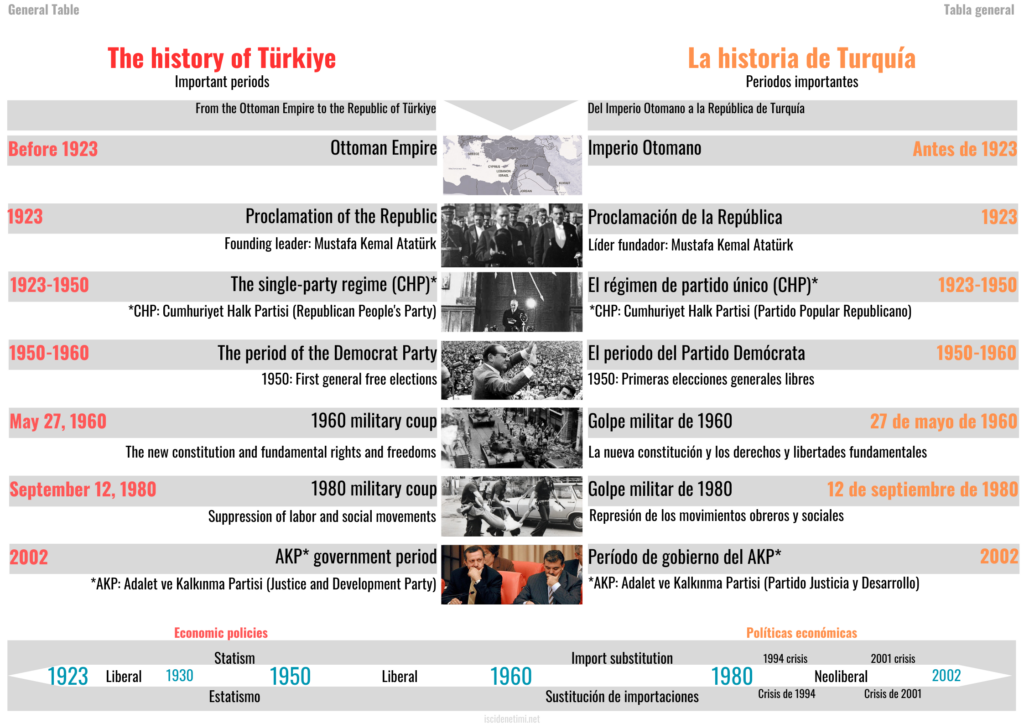
The first industrialization attempts began in the late Ottoman period (primarily with the military factories established by the state). As a result of the establishment of modern factories in the 19th century, the process of urbanization and proletarianization accelerated. However, the Ottoman Empire was an agricultural country and industrialization was weak (compared to Europe). Industry was concentrated in certain regions and cities such as Istanbul, Thessaloniki, and Izmir.
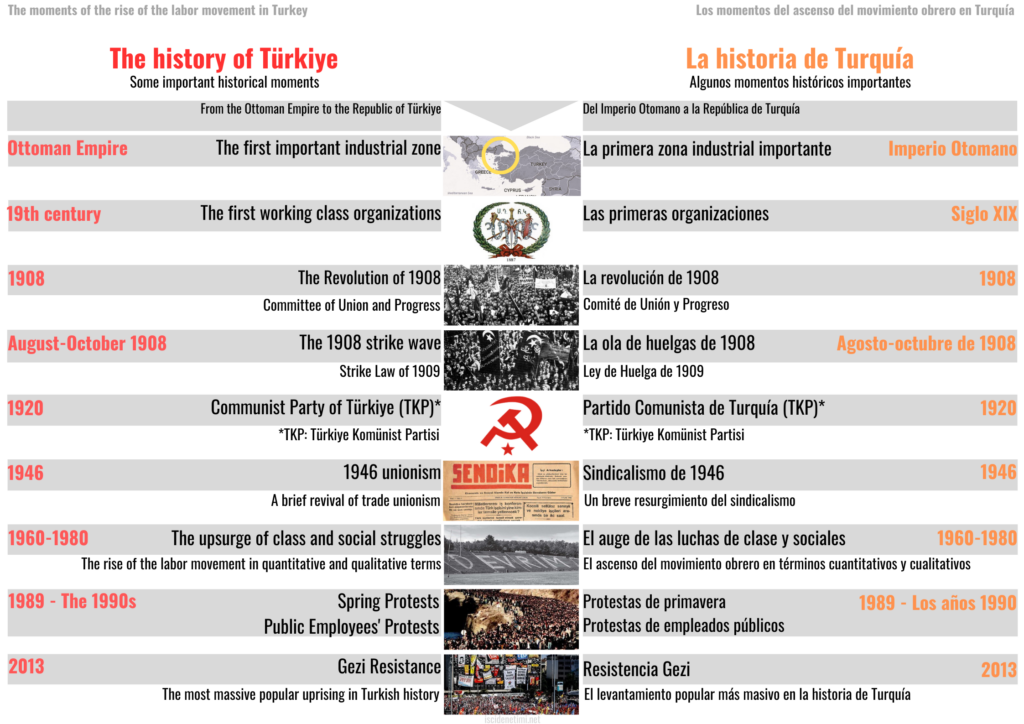
The first labor movements and organizations parallel to industrialization also began to emerge in this period. In the second half of the 19th century, strikes and non-strike labor movements (such as machine breaking) were experienced. There were different nations under the Ottoman Empire. The first labor organizations and socialist organizations included the Revolutionary Hunchakian Party, the Bulgarian Social Democratic Party, the Macedonian Revolutionary Social Democrats Union, the Ottoman Workers’ Union, the Tobacco Workers’ Felicity Society, and the Eastern Railway Company Workers’ Society. After the 1908 Revolution, labor actions and organizations began to increase. Between August and October 1908, there was a strike wave involving tens of thousands of workers in hundreds of factories. Following the increase in strikes, the Strike Law was passed in 1909, and organizing/unionizing was banned, and although strikes were not banned, they were not recognized as a right. The ban on unionization ended in 1947. Strikes were recognized as a right as a result of strikes and labor actions that broke out in the early sixties (after the May 27 military coup).
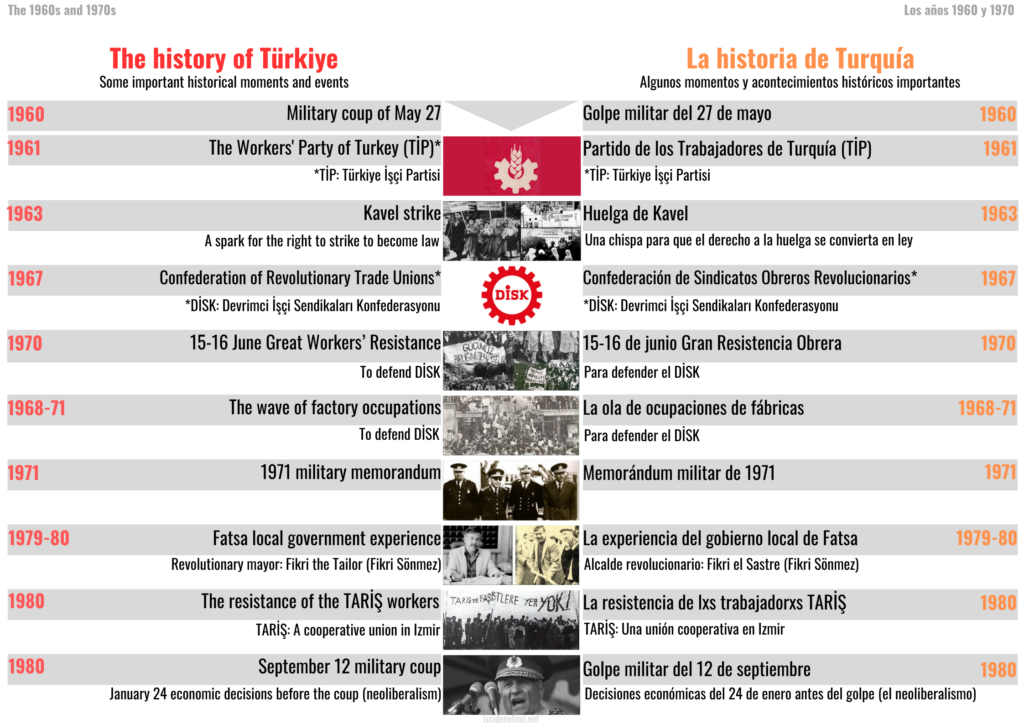
From the 1950s onwards, capitalist relations developed in Turkey, migration from rural areas to cities increased, and the process of proletarianization and urbanization accelerated. In the 1960s and 1970s, the labor movement in Turkey increased both quantitatively and qualitatively.
The Turkey Workers’ Party (TİP: Türkiye İşçi Partisi) was founded in 1961. In 1967, the unions that separated from TÜRK-İŞ founded DİSK (Devrimci İşçi Sendikaları Konfederasyonu), a militant union confederation. TÜRK-İŞ (Türkiye İşçi Sendikaları Konfederasyonu) was founded in 1952 and rejects class unionism. In 1968, as in the rest of the world, university youth, peasants and workers rose up in Turkey. Between 1967 and 1971, poor peasants carried out land occupation actions in many regions. During the same years, many factories were occupied by workers. The most important reason for the factory occupation actions was the prevention of workers from organizing under the roof of DİSK (by the state, employers and TÜRK-İŞ). The first experiences of workers’ self-management occurred during this period. Workers revolted on June 15-16, 1970 to defend DİSK and this uprising was the peak of the workers’ movement.
In the sixties and seventies, revolutionary movements also began to be established and grow. In 1971, the army intervened in politics and the parliamentary regime against the growth of the workers’ movement and socialist movements. However, it could not prevent the growth of the workers’ movement and revolutionary socialist movements. During this period, fascist organizations were mobilized against the workers’ movement and revolutionary movements. Various organizations were formed from below/base against the fascists (such as Resistance Committees).
In 1979, a popular local government (self-government) experience was experienced under the presidency of “Tailor Fikri” (Fikri Sönmez) in the Fatsa district of Ordu on the Black Sea coast of Turkey. However, the state intervened in this self-government experience with an operation and ended it. In 1980, a significant resistance broke out against the fascist organization in the TARİŞ cooperative union in İzmir. This resistance, which lasted for about a month, also spread to the neighborhoods of the city. The TARİŞ workers’ resistance, which the state was able to suppress with security forces, was the last major workers’ action before the military coup of September 12, 1980.
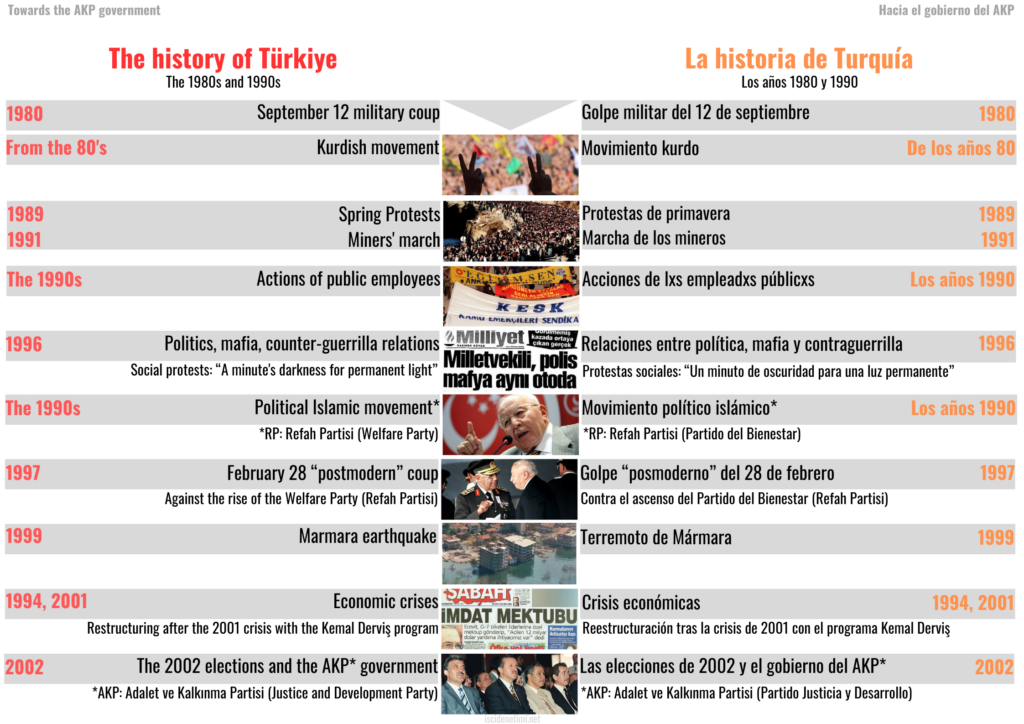
The military coup of September 12, 1980 suppressed the workers’ movement and the socialist movement. In this process, countless people were arrested, imprisoned, tortured and killed.
After the coup, only a few political parties allowed by the military regime participated in the general elections. The Motherland Party (ANAP: Anavatan Partisi), led by Turgut Özal, won the elections and began implementing a neoliberal program. The neoliberal economic program was decided before the military coup (on January 24, 1980).
The first spark in the darkness of the military coup was the İstanbul NETAŞ workers’ strike in 1986 (which produces telephone equipment). Afterwards, the Spring Actions in 1989, the miners’ march to the capital Ankara in 1991, the actions of public employees in the 1990s and the struggle for unionization are among the important labor actions. The labor movement rose significantly in the 1990s.
The 1990s were also a period when the Kurdish movement and the political Islam movement rose. The struggle of the Kurdish movement continues today in different ways. The political Islam movement (represented by the Refah Partisi in the 1990s) split into two with the “postmodern” military coup of February 28, 1997, and while one branch continued its politics in the same style, the other branch established the AKP and became “a center-right party”. The AKP came to power in the elections of November 3, 2002 and is still in power today.
The 1990s were chaotic years for the Turkey regime: the labor movement was on the rise, the Kurdish movement was growing, and the political Islamic movement was becoming a significant force. In addition, the most important traffic accident in Turkish history in 1996 (known as the Susurluk accident) exposed the state, mafia and counter-guerrilla relations. Following the accident, “A Minute of Darkness for Permanent Light” protests were held with the intense participation of citizens.
In the 1999 Marmara Earthquake tens of thousands of people lost their lives. This earthquake revealed that buildings were not earthquake-resistant and that state institutions were unprepared for disasters such as earthquakes.
The 2001 economic crisis can be considered a milestone in terms of the end of an era and the beginning of a new one. The economic, political and social problems that continued throughout the 1990s could not be solved by the dominant (center) political parties and governments. The 2001 economic crisis was the last straw after all these problems. There was a need for a political alternative, but after the 1980 military coup there was no leftist option. Center-left parties were the pillars of the existing system and were not seen as an alternative.
In the general elections of November 3, 2002, the AKP came to power (with the support of important cliques of the state and capital and a significant segment of the public) and is still in power today. During the AKP period (although there were important workers’ actions and the Gezi Resistance), the labor movement (except for the coup period) is at its weakest point since the 1960s.
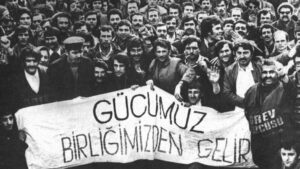
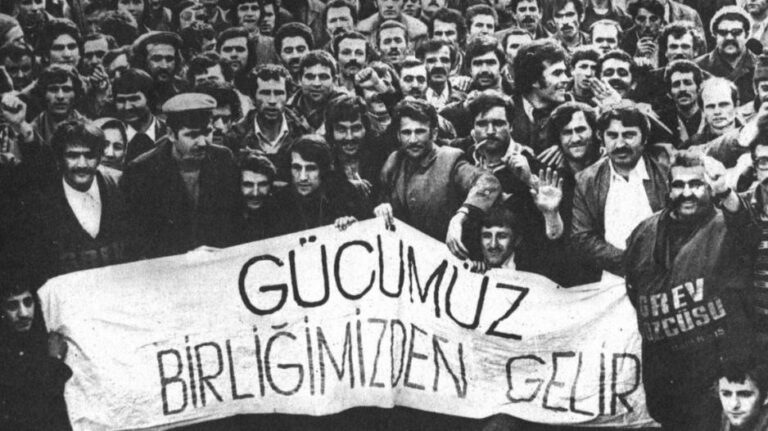
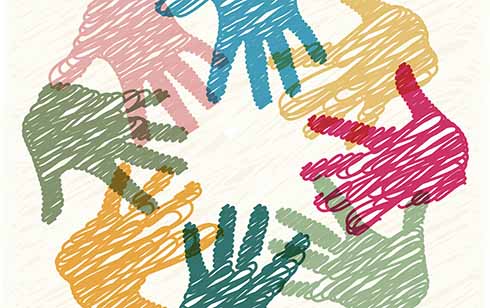
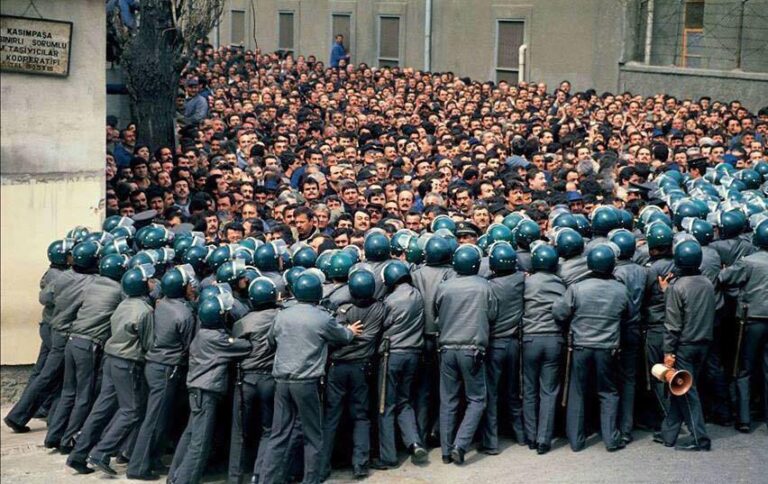
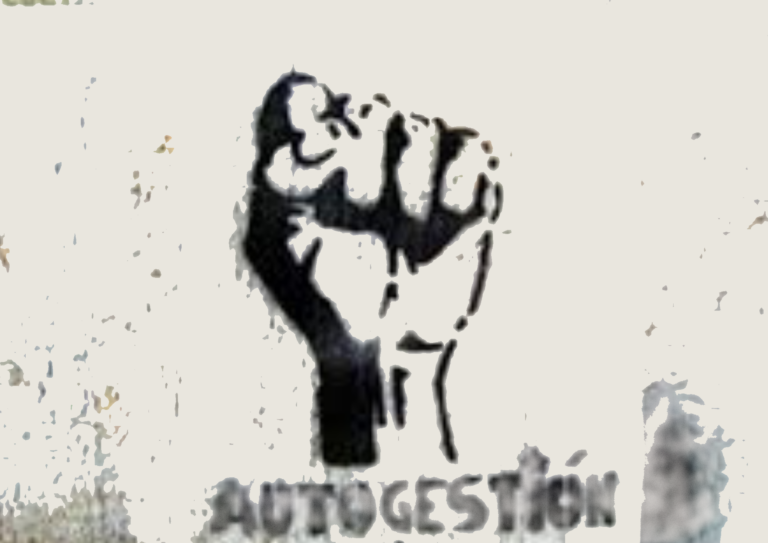
+ There are no comments
Add yours